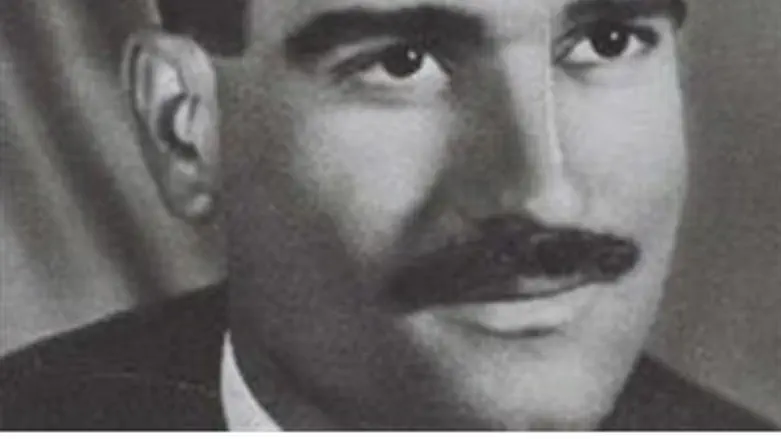
Eli Cohen, who infiltrated the highest echelons of Syria and was executed after his capture, is remembered by Israel and the world as the greatest Israeli spy.
After he was executed by hanging in 1965, Cohen was buried in Damascus, and the Syrian government rebuffed requests to allow him to be brought home for burial in Israel.
But now, fifty years later, new information has surfaced about Cohen's time in Damascus and in the then-Syrian-occupied Golan Heights, according to Walla! News.
Cohen's widow, Nadia, and his brother Avraham have been attempting to uncover the full Eli Cohen story for decades. Avraham spoke to the news agency on Monday and revealed the full sequence of events - and surprising US involvement.
In January 1962, Eli Cohen sailed from Genoa, Italy to Beirut, with a stop in Alexandria, Egypt. He then hitchhiked to Damascus from Beirut, as the story is told in Israel to this day, and bribed the guards at the border; the bribes enabled him to "escape" during a routine inspection of the vehicle at the border fence and slip into Syria. Cohen rented an apartment in front of the Syrian government offices.
But newspaper clippings in Arabic from the time reveal a slightly different version of events, Avraham stated Monday - that the slip through the border crossing was meticulously planned, and coordinated with other spy agencies.
"I don't have all of the sections of the newspapers, but what I have seen paints an amazing picture," he said. "During the proceedings of the military trial for Eli, the presiding judge asked him to reveal the names of the people he met in Syria."
One of those people was a "Majd Sheikh al-Arad" - a Central Intelligence Agency (CIA) agent in Syria, Avraham revealed. Al-Arad's first wife was Jewish, he added, and the spy helped smuggle Jews from Germany during the Holocaust, saving their lives.
With regard to Cohen, al-Arad had been tasked with bringing the Israeli agent to Syria. The two spoke over the phone from Cohen's hotel in Beirut. There, Avraham said, al-Arad enlisted the help of a Syrian spy to smuggle Cohen into Damascus - and the Syrian spy enabled Cohen to cross the border in a vehicle loaded with spy equipment.
Just that evening, Cohen attended a party among Kuwait's ambassador to Syria, Jordan's ambassador to Syria, and other members of the Syrian elite.
Cohen also penetrated the Golan Heights with these connections - no small feat, considering it was a "closed military zone" with entry only permitted by the approval of the Syrian Chief of Staff. Despite this, he managed to visit the Heights on three separate occasions, and then accompanied by Syrian officers. He was a guest at the Hotel El Hama, visited country clubs in the region with the Syrian elite, and saw the Sea of Galilee and northern valleys of the country that he loved and knew.
Once he returned to his Damascus apartment, he passed on the locations of the Syrian army stations, mines, tanks, and other military forces to the Mossad. Most of the information remains classified; in any event, Levi Eshkol, Israel's prime minister during the Six-Day War, stated that "the actions of Eli Cohen to Israel spared many divisions of soldiers, and the information brought was invaluable and resulted in the great victory in the Six Day War."
Throughout the three years he spent in Syria, Eli Cohen managed to win the friendships of top Syrian military officials; Lt. Gaza Zaher al-Din, nephew of the Syrian chief of staff, and Salim Hatum, commander of the Syrian Army (and later a judge at his trial) were regular guests at his home. Despite his deep undercover work - or rather because of it - he managed to send information to the Mossad every day.
Transmissions included sensitive political and military information, reports regarding who was in power, party relations, internal affairs in the Syrian government, government programs, Syria's partnership with the Soviet regime, and fortifications along the border, particularly the Golan Heights. He specifically prevented the diversion of the Jordan river waters away from Israel in 1964, by befriending top contractors involved with the scheme and passing along the information to the IDF.
He is also said to have provided Israeli aircraft with the locations of Syrian artillery batteries in the Golan Heights, enabling the IAF to destroy them early on in the war and prevent massive casualties to Israeli civilians located in the plains below.
Eli Cohen has become a subject of fascination worldwide, Avraham noted. The Syrian national poet Suleiman Al Issa wrote an ode to him in 1965, lauding his greatness and asking forgiveness; a large number of articles about Cohen have been published in Arabic.